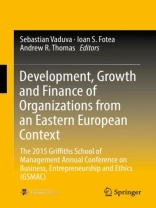This book explores challenges and approaches to the development, financial management and growth of Eastern European organizations, both public and private. Including papers derived from the 2015 Griffiths School of Management Annual Conference on Business, Entrepreneurship and Ethics (GSMAC), organized by Emanuel University of Oradea, the authors provide a variety of strategies for growth and development in areas such as IT, medical management, marketing, entrepreneurship and family business. Collectively, these contributions provide a problem-solving framework that tackles such questions as: How are the growth and financial models of organizations changing? How should leadership in organizations adapt in order to ensure sustainable growth? How should educational concepts and methods be improved to help the next generation in the new global business environment?
The rapid evolution of technology and innovation has changed the face of the business environment. With new actors in the global marketplace and new means of production, marketing and finance, businesses—particularly those in emerging regions, such as Eastern Europe—are faced with the pressure to rethink their structures and models from within. In this new economic climate, common issues such as corruption, risk, and customer satisfaction need to be examined from a globalized perspective. The goal of the 2015 GSMAC conference and the resulting papers is to help organizations and institutions in Eastern Europe and other developing regions formulate strategies and policies to thrive in this environment and promote sustainable management practices.
विषयसूची
Preface.- Chapter 1 Country Benchmarking of Setting up a New Business.- Chapter 2 The Image of Local Public Administration in Transylvania among Citizens.- Chapter 3 Entrepreneurial Myopia and Succession-Based Crisis in Family Business.- Chapter 4 The Development of Medical Business through Relational Marketing.- Chapter 5 Customer Satisfaction in IT Professional Services.- Chapter 6 The New Phase Transition of the World Economy.- Chapter 7 Managerial Creativity.- Chapter 8 The Absence of Entrepreneurial Foresight as a Reason for Entrepreneurial Failure.- Chapter 9 Merger and Acquisition Activity During the Fifth Wave.- Chapter 10 Managerial Fractal Intelligence.- Chapter 11 What are the Main Determinants of the Romanian Shadow Economy?.- Chapter 12 The Capabilities of Romanian Universities to Attract EU Funds.
लेखक के बारे में
Dr. Sebastian A. Văduva is the current Dean of the Griffiths School of Management at the Emanuel University in Oradea, Romania, as well as a management scholar with numerous active ties, academic and entrepreneurial, in both Europe and the United States. He has developed various seminars on leadership and effective management on both micro- and macro-economic levels and is behind several programs intended to boost Romanian economy by drawing in international investors and business partners.
Dr. Ioan Ş. Fotea is a university lecturer at the Emanuel University of Oradea, with an MBA and a Ph D in Marketing from the prestigious ASE (Academy for Economic Sciences) in Bucharest, Romania. He is the coordinator of Emanuel University’s Master in Entrepreneurial Management program and owns Advanced Solutions Ltd., an international business consultancy firm, while actively participating in various domestic and international business and social projects.
Dr. Andrew R. Thomas has conducted business in 120 countries on seven continents. A New York Times bestselling author, his books include
Aviation Security Management: A Three-Volume Set,
Air Rage: Crisis in the Skies and
Aviation Insecurity: The New Challenges of Air Travel. He is founding Editor-in-Chief of the
Journal of Transportation Security. Often featured on Fox News, MSNBC, CNN, ABC, and other media outlets, he lectures on supply chain security issues around the world.












